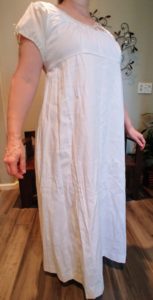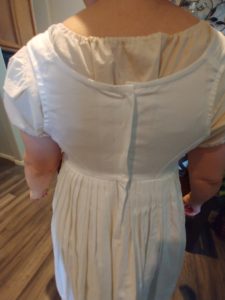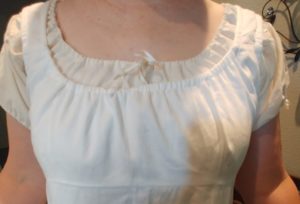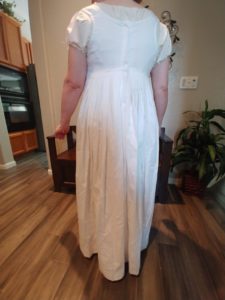 Over her shift or chemise and her stays, a Regency Lady wore a petticoat. This resembles a sleeveless jumper with a scooped neckline. The petticoat helps create a smooth canvas over which ladies wore the transparent muslins and silks of the era that were intended to flow elegantly around a lady’s form.
Over her shift or chemise and her stays, a Regency Lady wore a petticoat. This resembles a sleeveless jumper with a scooped neckline. The petticoat helps create a smooth canvas over which ladies wore the transparent muslins and silks of the era that were intended to flow elegantly around a lady’s form.
 Period petticoats tie shut at the back. It is anchored at the back with hooks and eyelets. This pattern is smooth at the front and sides, and pleated at the back to keep the streamlined silhouette while still allowing room for leg movement. Petticoats were often embellished at the hem with tucks or embroidery. Mine merely has a small drawstring.
Period petticoats tie shut at the back. It is anchored at the back with hooks and eyelets. This pattern is smooth at the front and sides, and pleated at the back to keep the streamlined silhouette while still allowing room for leg movement. Petticoats were often embellished at the hem with tucks or embroidery. Mine merely has a small drawstring.
 As you can see, I had my shift made from unbleached muslin and my petticoat made with a whiter fabric called sateen. We could have used bleached muslin, too. If a lady were very wealthy, she might be able to afford bleached muslin for her shift, too, but since petticoats were the only garment to be frequently washed, they had to be replaced much more often due to the harsh washing practices of the era.
As you can see, I had my shift made from unbleached muslin and my petticoat made with a whiter fabric called sateen. We could have used bleached muslin, too. If a lady were very wealthy, she might be able to afford bleached muslin for her shift, too, but since petticoats were the only garment to be frequently washed, they had to be replaced much more often due to the harsh washing practices of the era.
Some sources say that petticoats were intended to be seen, since a lady often needed to lift her outer dress to protect its far more expensive and delicate fabric. However I don’t know why she wouldn’t just lift all her skirts unless she’s trying to protect her stockings.
 In very cold weather our Regency lady probably worn additional petticoats for warmth, but her gowns would have to be made large enough to accommodate them, unless she is wearing an apron-style gown that is less fitted.
In very cold weather our Regency lady probably worn additional petticoats for warmth, but her gowns would have to be made large enough to accommodate them, unless she is wearing an apron-style gown that is less fitted.
I did find a period petticoat that had only shoulder straps instead of a bodice, but the style pictured seems to be the most popular.
To make this petticoat, we choose cotton sateen, which is a satin weave used to create a shimmery look. Sateen is made with spun yarn instead of filament. (The sheen and softer feel of sateen is produced through the satin weave structure.) Sateen is similar to muslin so it still feels authentic and has a really nice feel to it, a nice shimmer, and it drapes beautifully.
In looking at these photos, I probably should have ironed them before hand, but I can barely stand to iron nice blouses, much less an undergarment. Life is too short for that 🙂
You can read more scandals blogs about Regency underwear in my posts about shifts here and about stays here.

From my costume research, I was under the impression that the chemise was the most washed, since that was the garment closest to the skin.
Great article! Great explanation for the petticoat. 🙂